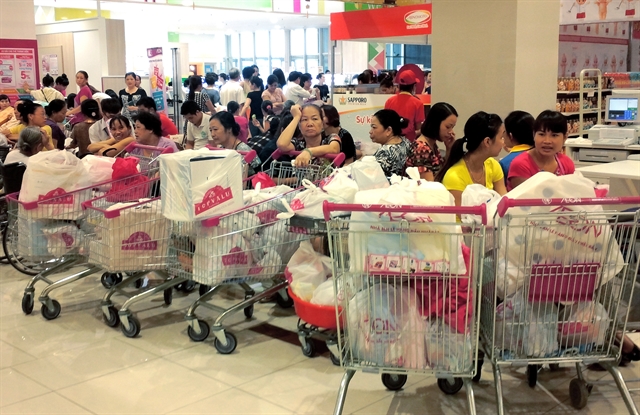The city is striving to use environmental packaging products instead of non-degradable nylon bags in wet markets, supermarkets, and shopping centers.

Single-use plastic bags play a significant role for most households.
From buying a single onion to a whole chicken, everything is packed in plastic bags, making it easier to carry and dispose of after use.
Eliminating plastic bags has never been an easy task as we haven't invented a cheaper and more convenient alternative to replace them. These bags continue to be used, as both producers and consumers are aware of this fact.
Tú, a beverage vendor in Hoàn Kiếm District, said that she is aware of the harmful effects of plastic bags, but she still needs to use them as some customers want to take the drinks away.
"I know that using plastic bags is not good, but they are convenient and cheap. I only use a plastic bag when customers ask for it," said Tú.
However, given the trend of green and sustainable growth, Hà Nội is striving to use environmental packaging products instead of non-degradable nylon bags in wet markets, supermarkets, and shopping centres.
Recently, the Hà Nội People's Committee has issued a plan to implement the National Action Programme on Sustainable Production and Consumption in 2024.
The plan aims to create a circular economy, promote domestic production and consumption, foster sustainable growth through technology, encourage import-export activities, create green jobs, promote sustainable lifestyles, and safeguard the environment and social security.
It also supports businesses and consumers in adopting digital solutions for sustainable practices, minimising waste generation, and raising awareness of sustainable production and consumption.
In particular, the capital city aims to achieve targets of reducing 3.5 - 4.5 per cent of raw material consumption in textile and garment, beverage steel, and plastic sectors. Or the rate of districts and towns aware of sustainable life reached 80 per cent, while 85 per cent of industrial zones and clusters and 60 per cent of craft villages have promoted information about sustainable production and consumption.
"Maintaining the objective of having 100 per cent of supermarkets and shopping centres, as well as 60–70 per cent of traditional markets, switch to biodegradable nylon bags. Besides, developing a sustainable supply chain and promoting the availability of eco-labelled items at retail establishments," according to the plan.
To achieve those targets, Hà Nội has to promote sustainable production and consumption by encouraging eco-friendly production, implementing sustainable models, and establishing a global network.
The People's Committee of Hà Nội has assigned the Department of Industry and Trade to take the lead in coordinating with other agencies, as well as relevant units and organisations to effectively implement this plan.
They will also collaborate with businesses to develop a roadmap for minimising plastic waste and hard-to-decompose nylon bags, while businesses have to commit to reducing the use of plastic bags.
Lê Xuân, an HCM City-based independent trader, welcomes the plan to phase out single-use plastic bags by the end of 2024 of the city.
"The plan shows Hà Nội's ambition in developing toward sustainable approach, which is also a trend of capital flows," Xuân said.
The green approach to economic recovery, which focuses on achieving dual objectives of economic growth and environmental protection, while effectively addressing climate change, is increasingly becoming the preferred choice for numerous nations, including Việt Nam, she added.
"Now, many countries, foreign companies and funds only choose to invest in places and enterprises with the green growth orientation. So this will be an advangtage for Hà Nội in attracting capital if the plan is successful."

Environmental industry
At the COP26 conference, Prime Minister Phạm Minh Chính made a commitment to achieve net-zero emissions by 2050. It requires a great effort of all the whole country's participants.
To support the big plan pursuing the sustainable growth, the Hà Nội People's Committee also plans to establish the environmental industry by 2025 as a significant economic sector to meet the demand for environmental protection.
It also seeks to concentrate on exporting environmentally friendly products, services and equipment to gain a competitive advantage.
Particularly, the city will develop technologies for environmental pollution analysis, inspection and control, as well as technologies for sustainable resource and urban environmental restoration, and for waste treatment and recycling.
It will also encourage the application and commercialisation of research and technology development results.
Hà Nội prioritises creating goods that are competitive and have advantages in the marketplace, essentially meeting the requirements of the country's capital for environmental protection.
The city also need to develop basic environmental services for hazardous waste management, urban solid waste, wastewater treatment and industrial waste.
With the plan, Hà Nội sets out seven groups of solutions and activities.
They include enhancing environmental policies, creating eco-friendly technology, encouraging environmental industrial enterprises, attracting investment, promoting investment in industrial projects, creating environmental services, developing human resources and increasing awareness to grow the environmental sector. — VNS





